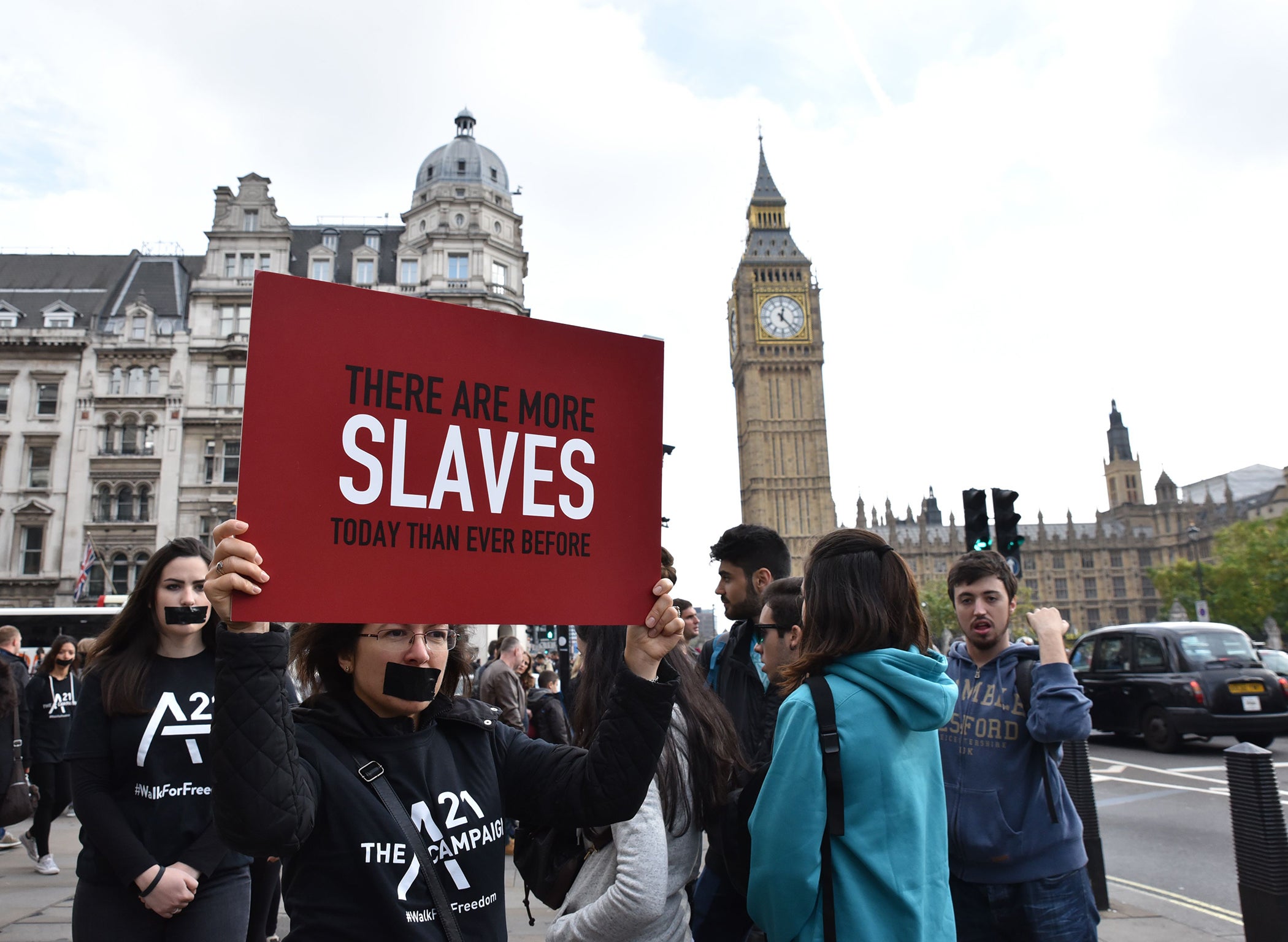Victims of slavery and human trafficking 'abandoned' as soon as they are identified
Exclusive: Trafficked victims who escape sexual exploitation and domestic servitude face 'sharp cliff edge' as no provisions are systematically put in place to assist their recovery

Hundreds of slavery victims in the UK are being “abandoned” by the authorities as soon as they are identified, placing them at risk of falling straight back into the hands of traffickers, experts have warned.
Charities said they are left “desperately trying to fill in the gaps” as vulnerable people fall into destitution, alcoholism and exploitation because of a lack of government-funded care.
Almost 1,400 victims of human trafficking, including cases of sexual exploitation and domestic servitude, were identified by the government's National Referral Mechanism (NRM) – the official framework for identifying victims of human trafficking – last year. Support is provided during the assessment process, which includes giving those fleeing exploitation a place in a “safe house”, but victims are required to leave the housing just two weeks after a final decision is made.
Theresa May announced on entering Downing Street that Britain would lead the fight against modern slavery, calling it “the greatest human rights issue of our time”. The Conservative Party has pledged “go further” on protecting victims of modern slavery in its election manifesto.
Under EU law, member states are required to provide assistance to identified victims of slavery and trafficking “in their physical, psychological and social recovery”. But charities have warned that such provision does not exist, with victims instead directed to join long waiting lists on the NHS, where the support they require often isn't available.
A damning report by the Work and Pensions Committee also warned people victims were ending up destitute as a result of insufficient support. It found no data is collected on victims after they have been assessed, which it condemned as “unacceptable”.
Lara Bundock, founder of the Snowdrop Project, a charity that supports victims of trafficking, said victims were being referred to them suffering from serious mental health problems. “They aren’t getting the psychological support they need and are often living in accommodation that is not in a fit state,” she said. “They’re mainly signposted to using the NHS, but there are huge waiting lists, and most NHS places don’t know about that entitlement and aren’t set up to look after those kinds of complex health issues."
It is estimated there are between 10,000 and 13,000 victims of modern slavery in the UK, but there are fears that many remain underground, with some reportedly choosing not to apply to the NRM because of a lack of belief that it would place them in a better position.
Under current rules, potential victims of modern slavery in England and Wales receive a minimum of 45 days of support, including accommodation, medical care and counselling in government-funded support, delivered by the Salvation Army.
Ms Bundock previously worked in one of the safe houses, which are managed by the Salvation Army and other subcontracted orgnisations. She said victims would begin to recover, but on leaving would face a "sharp cliff edge" when the support suddenly ended.
“We used to get phone calls either from professionals or from the clients themselves saying they’re really struggling and in need of help, but we weren’t really allowed or able to support or help them,” Ms Bundock told The Independent. “The issues we saw ranged from alcohol and drug addictions, to not being able to keep on top of their rent, to developing really serious mental health problems to going missing or getting into exploitative relationships again. These people had been taken in and supported, but then suddenly abandoned.”
In one case a European woman who had been sexually exploited appeared to turn her life around during her short time in the safe house, but within three weeks of leaving, her mental health had deteriorated and she had fallen into a destructive relationship.
Another former slavery victim, Sara, was employed as a domestic worker in her home country Gambia, when her employer, a diplomat, said she must come to work for her in the UK. She was told she would be able to earn enough to send enough money back to pay for her son to go to school. But when she arrived, Sara was forced to work for three different families located in separate parts of London. “I was told I would be working for my employer doing basic house duties, but when I got here, straight away I was working as a slave. Many extra duties were added on,” she told The Independent.
Sara was paid £100 a month, and worked from early in the morning until late at night. She slept on the floor in a room with the grandmother, and would be frequently woken up at night to tend to look after a disabled child. After escaping from her employer in 2013, Sara was found to have been a victim of slavery by the NRM, but was not offered leave to remain or given any financial support.
Charity workers warned that because foreign victims are not offered immigration rights after being identified, they are often left with no choice but to be moved to asylum accommodation, which is often “substandard” and situated far from any support base.
Kate Roberts, head of the Human Trafficking Foundation, said: “Once you’re in asylum accommodation it is often substandard and there isn’t any specialist support. I’m not saying it’s okay to put anyone in really substandard accommodation, but we’re talking about people who were trafficked, and it’s often not suitable for those people who are highly vulnerable, have big issues around trust and a need for support.”
On the issue of victims being offered no immigration status or rights, Ms Roberts said that while in some cases it would be most beneficial for a victim if they returned to their country of origin, in many cases this could lead to them being re-trafficked. “Although their mistreatment may have taken place in the UK, to just return someone to their home country where they may well have been groomed from and where the trafficker may be very powerful and have control over their family,” she said.
Marissa Begonia, a former victim of domestic servitude who now runs small London-based group supporting domestic workers who have often been trafficked, said many victims she knows choose not to apply to the NRM because they don’t believe it will help them. “If they escape from this abusive employment, is there something there that would protect them immediately? Nothing. After they escape, they are trapped again in a very manipulative system that pretends to be protecting them, but actually it’s meant to deport and arrest them,” she said.
Anne Read, director of anti trafficking and modern slavery at The Salvation Army, said that while the charity and its sub-contractors were working hard to help victims on their road to recovery, there were no official services in place to do this, and local charities were being left to “fill the gaps”. “At the moment there’s no accountability for the outcomes after they leave the service,” she said. “There’s no overarching body monitoring it. It’s not systematic or procedural. It’s just people stepping in and filling in the gaps.”
A pilot scheme to test ways to strengthen the NRM overseen by the Home Office was completed in March, with work currently underway to assess how to improve the system.
Subscribe to Independent Premium to bookmark this article
Want to bookmark your favourite articles and stories to read or reference later? Start your Independent Premium subscription today.





Join our commenting forum
Join thought-provoking conversations, follow other Independent readers and see their replies
Comments